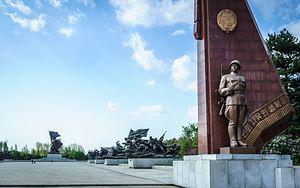The joint investigation into Japanese citizens believed to have been abducted by North Korean agents in the 1970s and 80s hit its first significant snag last Friday, as Japanese Chief Cabinet Secretary Yoshihide Suga read from a statement sent from Pyongyang that said, “We aim to complete the investigation in about a year, and we are now in the initial stage. As of now, we cannot provide an explanation beyond this stage.” North Korea had previously said its initial report would be delivered “from late summer to early autumn” after the details of the investigation were settled in July.
Both Suga and Prime Minister Shinzo Abe were quick to respond to the statement. Suga said “We recognize that negotiations (with Pyongyang) will not go smoothly,” but “we think that North Korean authorities know the whereabouts of all of the abducted Japanese citizens. We hope that North Korea will conduct (the reinvestigation) with sincerity.” North Korea’s assertion that the investigation would be completed in a year still appears to line up with Suga’s statements in May, when the negotiations were just beginning, in which he said the entire investigation would take no longer than one year. If Pyongyang is operating on that timeline then the full report may not be made available until July of 2015, if indeed it ever is.
Abe took a stronger line in his response, as in many ways he has staked a large part of his premiership on the resolution of this issue, saying the remaining 12 abductees will be accounted for before he leaves office. On Friday he said “It’s quite natural for the families of abducted Japanese to suspect that North Korea is just playing for time,” and in reference to Pyongyang’s thin statement, that “It is meaningless to receive a report that has no substantial content. Our demand is that North Korea issue a report that has substance.”
There has been little information so far on the subject out of North Korea beyond its initial statement. Japanese government sources who spoke with the Yomiuri Shimbun said that talks had recently deteriorated as “North Korea had developed a critical stance against Japan.” Although North Korea’s ambassador in charge of normalizing diplomatic relations with Japan, Song Il-ho, told Kyodo News earlier this month that Pyongyang “could issue the report at any time,” while also stating his hope that further sanctions would be lifted. It would appear that part of the report’s holdup has to do with North Korea’s insistence on further assurances from Japan that it would further ease sanctions in return for the initial finding’s release.
However, Japan has not lost time in applying what pressure it can, short of renewing unilateral sanctions. Foreign Minister Fumio Kishida said Japan would submit a resolution to the U.N. General Assembly on the current human rights situation in North Korea, possibly in November, as “The abductions are a serious violation of human rights, and caused immeasurable suffering to the victims and their families.” Kishida also said that Japan would submit a joint resolution with the EU concerning the issue, and that “Japan will play a main part in ensuring that these measures result in concrete actions.”
It appears that North Korea is playing a tenuous game of show and tell with Japan, seeking to gain maximum assurances on aid and sanction relief in return for parsing out information, possibly over the span of the next 10 months. Japan does not yet appear willing to abandon the ongoing joint investigation, despite its growing impatience and public displays of disapproval. The issue is still far too politically important for Abe, whose popularity was buoyed somewhat this summer by the abductee progress amid an economic reversal due to his consumption tax increase and popular disapproval of the government’s reinterpretation of collective self-defense.
North Korea’s ongoing and increasing isolation in the region was highlighted last week when its Workers’ Party secretary for international relations Kang Sok-ju was not met by any Chinese officials as he traveled through Beijing twice in five days, in order to make a tour through Europe. Kang’s trip to five European countries was rare, and was described by South Korean officials “as an attempt to break [North Korea’s] isolation,” according to Yonhap News. Yet Beijing still appears to be unwilling to resume relations (and more importantly aid and energy supplies) since Pyongyang’s third nuclear test and the execution of Jang Song-thaek, North Korea’s key emissary to China.
Yet despite this isolation, North Korea is pushing hard for Japan to make further concessions. Indeed, in this situation Pyongyang understands that it “holds all the cards. It is figuring out what benefits it can reap in exchange for issuing the first report,” according to a Japanese official who spoke with the Asahi Shimbun. Additionally, a senior official in the Japanese Foreign Ministry said “Even if we demand that North Korea set a deadline for issuing the first progress report (and North Korea agrees to it), Pyongyang could break the deadline again.”
However, Pyongyang can only withhold the information for so long before public sentiment in Japan turns against it. Other government sources told Asahi that “North Korea apparently did not realize that expectations were riding so high in Japan.” The Japanese public could become convinced that North Korea is simply parsing out snippets of information in exchange for concessions, with no real intent to fully disclose the whereabouts of the remaining abductees, in which case the anguish of their Japanese families (as well as Pyongyang’s isolation) will continue indefinitely.

































